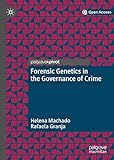Forensic Genetics in the Governance of Crime
Material type: ArticleLanguage: English Publication details: Singapore Springer Nature 2020Description: 1 electronic resource (114 p.)ISBN:
ArticleLanguage: English Publication details: Singapore Springer Nature 2020Description: 1 electronic resource (114 p.)ISBN: - 978-981-15-2429-5
Open Access star Unrestricted online access
This open access book uses a critical sociological perspective to explore contemporary ways of reformulating the governance of crime through genetics. Through the lens of scientific knowledge and genetic technology, Machado and Granja offer a unique perspective on current trends in crime governance. They explore the place and role of genetics in criminal justice systems, and show how classical and contemporary social theory can help address challenges posed by social processes and interactions generated by the uses, meanings, and expectations attributed to genetics in the governance of crime. Cutting-edge methods and research techniques are also integrated to address crucial aspects of this social reality. Finally, the authors examine new challenges emerging from recent paradigm shifts within forensic genetics, moving away from the construction of evidence as presented in court to the production of intelligence guiding criminal investigations.
H2020 European Research Council
Creative Commons https://creativecommons.org/licenses/by/4.0 cc https://creativecommons.org/licenses/by/4.0
English
There are no comments on this title.

